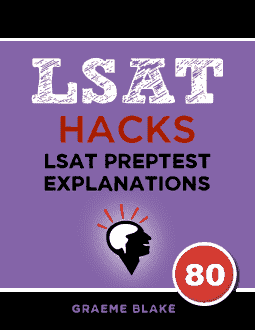QUESTION TEXT: A contract between two parties is valid only if one…
QUESTION TYPE: Principle – Justify
PRINCIPLE:
Contract valid ➞ One party accepts legitimate offer from other
Legitimate ➞ Reasonable belief offer not made in jest
ANALYSIS: You can’t combine those two statements in an exact conditional chain, but you can make this inference: if an offer reasonably seems to be a joke, then there can be no legitimate offer and therefore no valid contract.
That’s the only conclusion you can draw, so you should look for a joke or a non-legitimate offer leading to no valid contract. When I solved this question, I literally just skimmed the answers looking for those two factors, and quickly found the correct one.
You can also just take the contrapositive of the first statement: no legitimate offer accepted ➞ no valid contract. The correct answer pretty much just says that.
Also, note that you can eliminate any answer that talks about a valid contract. We have no way of proving a contract is valid: it’s a sufficient condition, and you can never prove a sufficient condition.
___________
- There are two problems here:
1. Sandy needs to accept the offer in order to fulfill the necessary condition. “Not rejecting” isn’t acceptance.
2. That’s just the necessary condition for a valid contract. There could be other conditions required as well. For this reason, you can never prove a sufficient condition by proving the necessary. - This is tempting, but the stimulus said the offer was only invalid if the party to whom it was made “reasonably believed the offer was made in jest”. Here, Kenta seems to have taken the offer as genuine, and so that condition doesn’t apply.
- This doesn’t apply at all. The stimulus didn’t say “any legitimate offer will be accepted”. That’s actually an insane principle. You could legitimately make a terrible offer, and you would be rejected. Legitimate means “honestly intended” and not “financially valuable”.
- This has one of the same problems as A. Accepting an offer is a necessary condition for a valid contract. But it’s not a sufficient condition. There might be other requirements for a contract. For example, maybe they need to sign a document. (This isn’t actually true of contracts, that’s just for sake of example. Contracts can be oral only)
- CORRECT. See the analysis above. If there’s no legitimate offer, there’s no valid contract. “Legitimate offer” was a necessary condition for a valid contract.
Recap: The question begins with “A contract between two parties is valid”. It is a Principle – Justify question. To practice more Principle – Justify questions, have a look at the LSAT Questions by Type page.


Leave a Reply